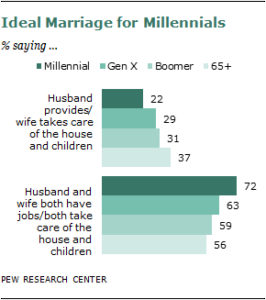Actress Gabrielle Union recently revealed that she was the one to push for a prenup before she tied the knot with NBA baller Dwyane Wade—but it turns out that Union’s request is far from uncommon and is a sign of the growing desire for egalitarian relationships among modern couples.
The stunning Being Mary Jane actress recently talked to Yahoo Style about why she was so adamant about getting a prenup, explaining that she wanted to make it clear that her brand and her career was separate from her soon-to-be husband’s.
“For women in Hollywood, when they’re coupling, everything is about the brand,” Union said. “Everything is about latching on to a rising star, so you can kick your heels up. That’s never been my story, ever. I make sure to let people know all of the hard work that’s gone into my career. I want people to know the work that it took to get through UCLA, that I had student loans and worked. I was eating Top Ramen and lived well below my means. Now that it’s time to get married to a man who happens to play basketball and has done well for himself, I want to make it clear that I have in no way hitched my wagon to his star. I have my own wagon and star.”
That same concept is also one of the many problems with Mike Huckabee’s comments that Jay-Z was “pimping” his wife, Beyonce.
It’s also a view on relationships that is increasingly more common.
The dynamic of modern-day couples is certainly much different than relationships of the past.
Both young women and young men are pushing for egalitarian relationships, meaning they both would share equal benefits, burdens and responsibilities in the relationship, whether those be emotional, physical or financial.
While modern-day couples hope to thrive as a harmonious unit, there is also a particularly strong focus on who the two partners are as separate individuals.
A study from the University of Texas at Austin and the University of California-Santa Barbara revealed that the majority of unmarried, childless men and women between the ages of 18 and 32 would like to structure their relationship so that both parties share earning and household/caregiving responsibilities equally with their partner.
The study also found that if workplace policies support work-family balance, more women are likely to prefer an egalitarian relationship and are far less likely to want to be the primary homemaker or caregiver.
In other words, stay-at-home mothers are becoming much less common, and both parents hope to serve as breadwinners and caregivers in a relationship that equally splits those responsibilities.
The study supports the trend of increasing prenup requests by women.
Now that more women are hoping to build their own successful careers with their own “wagon and star,” as Union says, these women also hope to protect their finances in the event the relationship doesn’t work.

According to the researchers behind the University of Texas at Austin and University of California-Santa Barbara study, these trends suggest that more employers need to support the growing desire for egalitarian relationships by providing subsidized child care and other policies that support work-family balance.
“Our study provides compelling evidence that if policies such as flexible scheduling, parental leave, and subsidized child care were universally in place, women would be even more likely to want an egalitarian relationship with their partner and much less likely to want to be primarily responsible for housework and child care,” said David S. Pedulla, an assistant professor of sociology and a faculty research associate in the Population Research Center at the University of Texas at Austin, who co-authored the study. “These findings offer new insights that may be useful in guiding policymakers and organizations that are interested in reducing gender inequality and improving the work and family lives of young men and women.”

